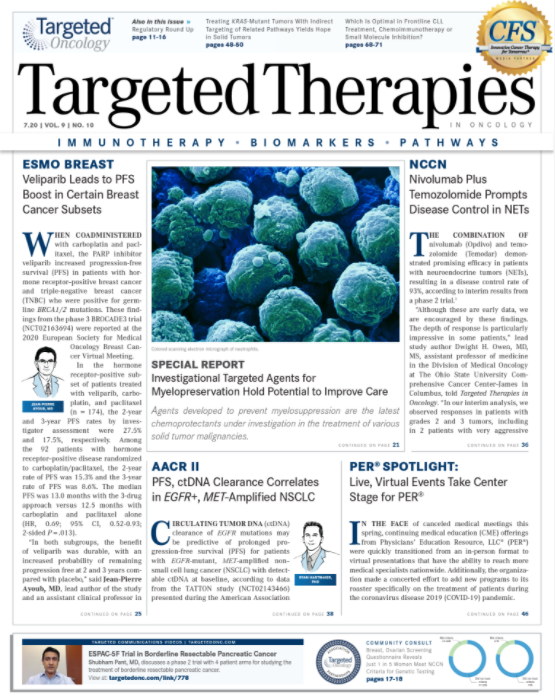Live, Virtual Events Take Center Stage for PER
In the face of canceled medical meetings this spring, continuing medical education offerings from Physicians’ Education Resource, LLC® were quickly transitioned from an in-person format to virtual presentations that have the ability to reach more medical specialists nationwide.

In the face of canceled medical meetings this spring, continuing medical education (CME) offerings from Physicians’ Education Resource, LLC® (PER®) were quickly transitioned from an in-person format to virtual presentations that have the ability to reach more medical specialists nationwide (take our POLL on the impact of a virtual meeting format at the end of this article). Additionally, the organization made a concerted effort to add new programs to its roaster specifically on the treatment of patients during the coronavirus disease 2019 (COVID-19) pandemic.
Early on in the pandemic, PER® and its parent company MJH Life Sciences™, the largest privately held, independent, full-service medical media company in North America, moved quickly to bring oncologists the most up-to-date information on treating patients with cancer through these challenging times. PER®started hosting webinars focused on COVID-19 and has now launched a series, “COVID-19 and Cancer Care: What Oncologists Need to Know Today.” The first live CME-certified COVID-19 webinar that aired on March 23 drew a virtual audience of more than 1200 attendees, who tuned in to hear oncology experts discuss the risk and potential impact of COVID-19 for patients with hematologic and solid tumor malignancies, optimal preventive protocols for how oncologists could protect themselves and their staffand across inpatient and outpatient settings, and therapeutic strategies.
The “COVID-19 and Cancer Care” program has evolved into an ongoing live meeting series, occurring every Monday, and features insights from eminent practicing oncologists.
Beyond COVID-19–focused online CME activities and webinars, the transition of various live events and conferences from an in-person to a digital format has been a driving force at PER®. One innovation is the ASCO Direct Highlights™ series featuring expert analysis of clinical findings presented during the 2020 American Society of Clinical Oncology (ASCO) Virtual Annual Meeting. These sessions aired live in June on PER®’s website to registered participants.
PER® also quickly transformed its multiday in-person conferences to a virtual format. Just 1 day before the 13th Annual Interdisciplinary Prostate Cancer Congress® and Other Genitourinary Malignancies conference was scheduled to take place on March 13, New York Gov. Andrew M. Cuomo formally banned all public gatherings of more than 500 people. MJH Life Sciences™, however, had already made the decision days before to pivot and present the conference as a virtual meeting.
According to meeting organizers, it’s difficult to mirror an in-person program. Clinicians come to events not only to stay up-to-date on the content, but also to interact with the experts and ask them questions.
“The biggest opportunity we had, which was also the biggest challenge, was how to create highly interactive programs where there can be Q&A, where attendees can interact with the faculty in real-time, and where faculty can poll the audience and comment on what their results are in real-time. These are the components that really foster that interaction with a capital ‘I,’” Phil Talamo, CHCP, president of PER®, said regarding the changes to the meeting format. “And it is something that attendees have come to expect from a first-class PER® educational session.”
Talamo and his team at PER® rose to meet the challenge, converting 100% of programing that was scheduled from in-person events to virtual events. Additionally, the company has seen a low opt-out rate, and many repeat attendees. Feedback from the events has been that the programing is engaging and interactive, and attendees like the ability to be able to ask questions.
Participation in the virtual meetings mirrors that of the in-person events. Attendees come for the content and the faculty, Talamo said. “The programs that do well live and in person also do well online. For virtual programming, we have been designing them to be content-relevant based on timeliness. Depending on the data cycle, the format may change. We’ve done a number of post-ASCO webcasts and depending on the ASCO data [that we are presenting], we’re going to have varying methods of disseminating data, with both traditional lectures that provide detailed analyses of new studies, and also panel discussions such as Medical Crossfire to address diverse perspectives of data interpretation.”
Despite the disruption caused by the COVID-19 pandemic, PER® has continued its mission to keep community oncology care providers informed and connected with experts in the field.
“We fulfilled our commitment to the community to make sure that education was available. We have proven that we can continue to be the trusted provider and resource in education through both virtual and on-demand activities. So even if this [pandemic] continues into next year, our incredible team has done a very nice job of keeping the community armed with the data they need and the expertise to care for their patients,” he said.
Although Talamo is unsure when live events will resume, he expects that when they do, there will likely be a virtual component to all events. Clinicians may still be unable to attend because of institution restrictions on travel. These clinicians, however, depend on the data that are provided through these events to treat their patients. There is so much uncertainty about COVID-19, and no one knows what is going to happen next, he said.
“The one thing we do know is people are still going to get cancer, and they are still going to need state-of-the-art treatment. Things are going to continue to change and evolve. We want to make sure we are doing all we can as a trusted provider of education to support clinicians. The impact of COVID is real, and the spirit of the oncology community is going to lead to a positive path forward,” Talamo said.
When live medical meetings shift to a virtual format, what is the greatest impact on practicing physicians?
<< View more content related to COVID-19

Survivorship Care Promotes Evidence-Based Approaches for Quality of Life and Beyond
March 21st 2025Frank J. Penedo, PhD, explains the challenges of survivorship care for patients with cancer and how he implements programs to support patients’ emotional, physical, and practical needs.
Read More